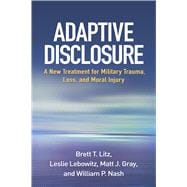
Adaptive Disclosure A New Treatment for Military Trauma, Loss, and Moral Injury
by Litz, Brett T.; Lebowitz, Leslie; Gray, Matt J.; Nash, William P.Buy New
Rent Textbook
Rent Digital
Used Textbook
We're Sorry
Sold Out
How Marketplace Works:
- This item is offered by an independent seller and not shipped from our warehouse
- Item details like edition and cover design may differ from our description; see seller's comments before ordering.
- Sellers much confirm and ship within two business days; otherwise, the order will be cancelled and refunded.
- Marketplace purchases cannot be returned to eCampus.com. Contact the seller directly for inquiries; if no response within two days, contact customer service.
- Additional shipping costs apply to Marketplace purchases. Review shipping costs at checkout.
Summary
Author Biography
Leslie Lebowitz, PhD, is a clinical psychologist in private practice in Newton Center, Massachusetts. She consults extensively in forensic contexts and provides training in the area of trauma in both community and military settings. Dr. Lebowitz developed the psychological portion of the curriculum for training Air Force Sexual Assault Response Coordinators and continues to do biannual training for the Air Force. Her research focuses on the psychological meaning of trauma and the implications for treatment. Previous research examined the aftermath of sexual violence, and more recent work addresses traumatic loss and moral injury.
Matt J. Gray, PhD, is Professor of Psychology at the University of Wyoming. His research focuses on treatment development for broad emotional and psychological impacts of combat, as well as prevention and treatment of sexual violence and intimate partner violence. Dr. Gray has published numerous articles in peer-reviewed journals. He has received the Extraordinary Merit in Research Award and the Outstanding Psychology Faculty Member Award on multiple occasions from the University of Wyoming.
William P. Nash, MD, is Director of Psychological Health for the U.S. Marine Corps. While on active duty in the Navy, Dr. Nash was deployed to Iraq with Marines of the 1st Marine Division during the Second Battle of Fallujah. His current interests focus on the prevention, recognition, and treatment of combat and operational stress injuries, including moral injury. He is coeditor of Combat Stress Injuries: Theory, Research, and Management and founding chair of the Military Committee of the Group for the Advancement of Psychiatry.
Table of Contents
2. Background and Evidence
3. Military Culture and Warrior Ethos
4. Guiding Principles of Adaptive Disclosure
5. Assessment, Case Conceptualization, and Treatment Planning
6. Beginning Adaptive Disclosure: Session 1
7. The Exposure Component: Active Treatment Sessions 2 to 7
8. Breakout Components for Loss and Moral Injury: Active Treatment Sessions 2 to 7
9. Ending Treatment and Planning for the Future
10. Using Adaptive Disclosure when Prior Complex Trauma is Present
Appendix 1. Diversity of Military Missions, Organizations, and Relationships
Appendix 2. The Meaning and Implication of Key Events
Appendix 3. Calming and Attention Focusing Techniques
References
Index
An electronic version of this book is available through VitalSource.
This book is viewable on PC, Mac, iPhone, iPad, iPod Touch, and most smartphones.
By purchasing, you will be able to view this book online, as well as download it, for the chosen number of days.
Digital License
You are licensing a digital product for a set duration. Durations are set forth in the product description, with "Lifetime" typically meaning five (5) years of online access and permanent download to a supported device. All licenses are non-transferable.
More details can be found here.
A downloadable version of this book is available through the eCampus Reader or compatible Adobe readers.
Applications are available on iOS, Android, PC, Mac, and Windows Mobile platforms.
Please view the compatibility matrix prior to purchase.
